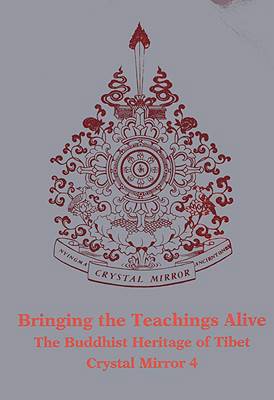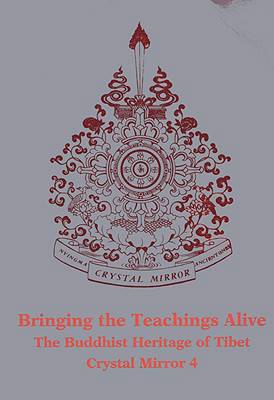
- Afhalen na 1 uur in een winkel met voorraad
- Gratis thuislevering in België vanaf € 30
- Ruim aanbod met 7 miljoen producten
- Afhalen na 1 uur in een winkel met voorraad
- Gratis thuislevering in België vanaf € 30
- Ruim aanbod met 7 miljoen producten
Zoeken
Bringing the Teachings Alive
The Buddhist Heritage of Tibet
Tarthang Tulku, Anagarika Govinda, Herbert V Guenther
€ 35,45
+ 70 punten
Omschrijving
In this series of essays Tarthang Tulku Rinpoche offers the reader a guide to what he considers essential to the understanding of the path to enlightenment presented in the Buddhist teachings. He reminds us that " Studying the Dharma means to look at ourselves honestly--not as we would like to be or should be, but just as we are. . . .it is important to use this present situation, whatever it is, to feel more positive, more balanced, and more able to live harmoniously with others." More than a series of doctrines and practices, the Buddha's teachings express universal truths. Chapters on bringing the teachings alive, the teachings and their application, taking the teachings to heart, and sustaining practice take the reader step by step to a deeper understanding of the Dharma and closer to touching the heart of freedom that meditation offers. Placing the teachings in the context of the land, people, and culture of Tibet, and Lama Govinda's article "A Tibetan Buddhist Looks at Christianity," offer a wider view of the impact of these teachings.The main focus throughout is the transmission and heritage of the Buddhist teachings in Tibet. The understanding of the oldest of the schools of Tibetan Buddhism --the Nyingma lineage-- is expressed in the Vajrayāna. The ancient transmission of the Vajrayāna teachings, the highest expression of Buddhist theory and practice, includes a wide range of approaches such as philosophy, psychology, meditation, and ritual practice. All of these are vast subjects and this volume can only begin to lay the foundation for study and practice.The translation the first volume of Longchenpa's trilogy "The Natural Freedom of Mind" by Herbert V. Guenther lays out in detail the path of meditation and realization. and is prefaced by Tarthang Tulku's insight into the Nyingma Lineage and its development through the ages. The life of Padmasambhava, biographies of his twenty-five disciples and his female disciples help in the understanding of this development and transmission. The lasting gift of this heritage is "the most valuable, the most useful, the most reliable knowledge--knowledge of out own minds."
Specificaties
Betrokkenen
- Auteur(s):
- Uitgeverij:
Inhoud
- Aantal bladzijden:
- 356
- Taal:
- Engels
- Reeks:
- Reeksnummer:
- nr. 4
Eigenschappen
- Productcode (EAN):
- 9780898003628
- Verschijningsdatum:
- 1/01/2004
- Uitvoering:
- Paperback
- Formaat:
- Trade paperback (VS)
- Afmetingen:
- 175 mm x 249 mm
- Gewicht:
- 680 g

Alleen bij Standaard Boekhandel
+ 70 punten op je klantenkaart van Standaard Boekhandel
Beoordelingen
We publiceren alleen reviews die voldoen aan de voorwaarden voor reviews. Bekijk onze voorwaarden voor reviews.











